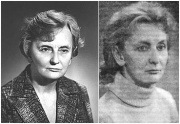Augusta, Aushra
Aushra Augusta, or Aushra Augustinavichiute (April 4, 1927 — August 24, 2005), was a Lithuanian economist, sociologist, and founder of socionics. She was born near Kaunas in the family of a book publisher. In 1956 she graduated from the economics department of the Vilnius University as a financial specialist. After graduation she worked in the Ministry of Finances of the Lithuanian SSR ("Soviet Socialist Republic") and taught political economics in institutes in Vilnius. For a brief period in 1968 she was dean of the department of family research at Vilnius University.
Augusta's self-typing was ILE, which has been disputed by few socionists who knew her.
Contents |
Research
In the 1960s, A. Augusta was one of the first people in the USSR to study sociology when it was still not recognized by Soviet academia and was persecuted as a "false science". Aside from sociology Augusta was interested in the problems of family relationships and sexology.
In the early 1970s, she discovered Jung's Typology, Freud's theory of psychoanalysis, and Kempinsky's theory of information metabolism, on the basis of which she and her associates developed the theory of socionics. Later, in the mid-80s, Augusta learned of Myers-Briggs Typology, on the basis of which she tried to improve socionics.
In 1978, A. Augusta wrote the article "The Theory of Relativity of Erotic Feelings" and published through samizdat the first version of the article The Dual Nature of Man. These were the first works on socionics.
In 1980, she published an article analyzing socionic types through Model A in the Lithuanian magazine Mokslas ir Technika, which drew harsh criticism from psychologists but great interest from readers, and published a new work, The Theory of Intertype Relations. In the 1980s she published a series of works on socionics, many of which were deposited in the library of the Lithuanian Academy of Science. In the 1990s she withdrew from active participation in the socionics community.
Reminiscenses
(as related to Rick DeLong by Aleksandr Bukalov, Olga Karpenko, Igor Weisband, and others)
Augusta was known for her intellectual energy and inquisitiveness that provided the drive for the development of socionics during the 70s and 80s. During this period she attracted around her a highly motivated group of intellectuals who were absorbed with the discoveries they were making together. This group would frequently gather at informal retreats at her summer home in Lithuania. Many or most socionists who knew her refer to her as a genius, but also recognize her idiosyncracies, which included a disregard for other people's feelings when intellectual issues were being discussed. For instance, she was known for telling people to sit down at socionics conferences for "speaking from their Super-Ego" or for chastising people who weren't "speaking their own thoughts," but were parroting what someone else had told them.
After the initial period of socionics' development when the main concepts were ironed out among Augusta and her close associates, knowledge of socionics began to spread to other cities — apparently due to several articles published in popular journals by Augusta. Augusta and others traveled to visit new groups, and many came to visit her in Vilnius. For several years, if not more, people would gather at her summer house in the Lithuanian countryside to talk about socionics and interact together. Bukalov and Karpenko have related fond memories from this period.
Socionist Igor Weisband reports that Augusta was perplexed by clan-based power structures in the Soviet Union that seemed to be based on personal relationships alone, and that this caused her to look for explanations outside of the official Marxist-Leninist ideology, which refused to consider personal relationships a significant factor in societal evolution. Other sources state that the main impetus for Augusta's intellectual search was the realization that people are often unable to have the good relationships that they want. She became deeply convinced that relationship quality was determined and was not subject to individuals' free will. Another influence may have been her own not-so-perfect relationship with her spouse, an LSE (relations of "benefit," or "request").
After Aleksandr Bukalov established the International Institute of Socionics in Kiev, Ukraine, some rivalry or differences of opinion arose between Augusta and the group in Kiev, or perhaps with Bukalov himself. Augusta came to the conferences for several years, then stopped coming as her health worsened. Perhaps she felt marginalized by the socionics community. In fact, two volumes of her works were published without her approval by someone else, and she apparently did not receive any royalties from book sales. Now a pensioner, Augusta lived a very poor life like almost all elderly people in the former Soviet Union after its collapse. Emissaries from Kiev and Moscow schools of socionics would collect donations and bring them to her in person to help her subsist. In her final years Augusta became involved in mysticism, which drew criticism from many socionists.
- The Dual Nature of a Person – Vilnius, 1994.
- Socionics. Introduction, Sociotypes, Tests – Terra Fantastica, 1998.
- The Theory of Intertype Relations – Chelyabinsk, 1991.
